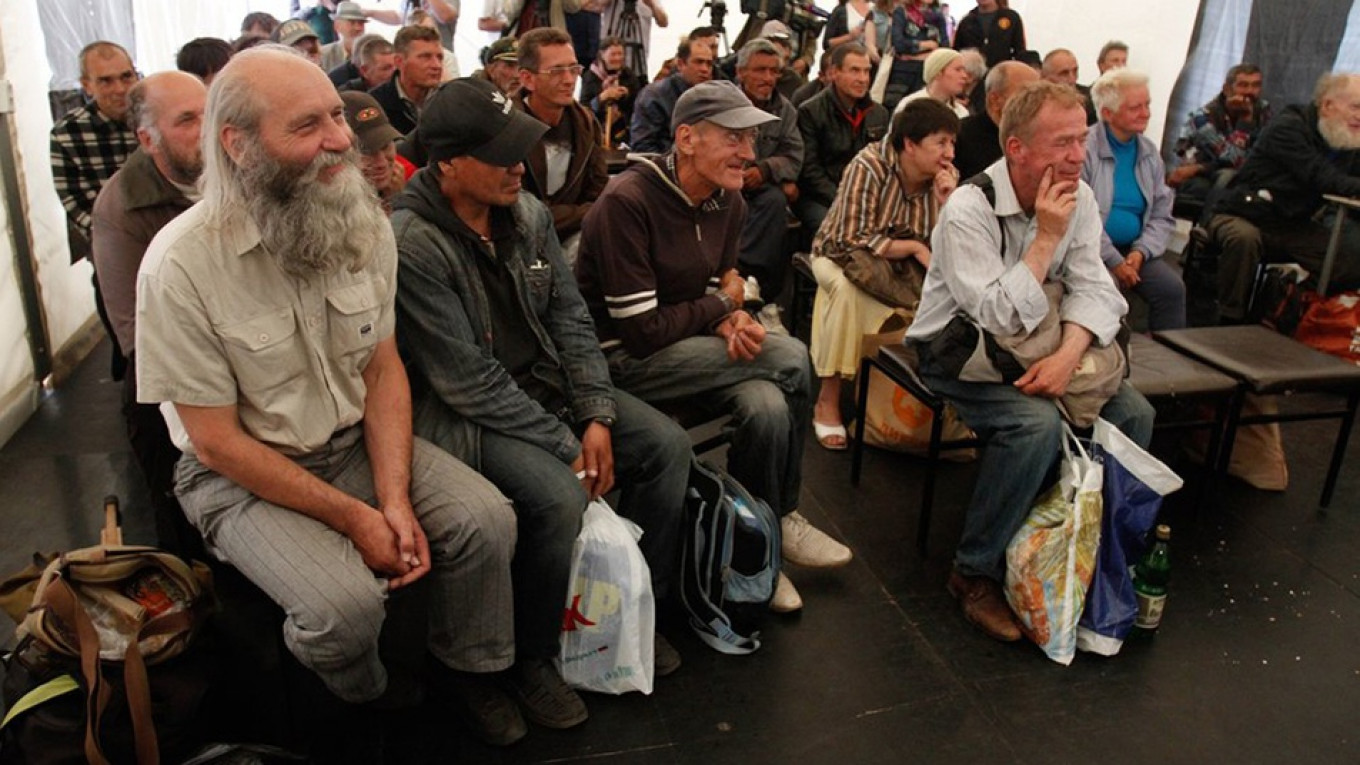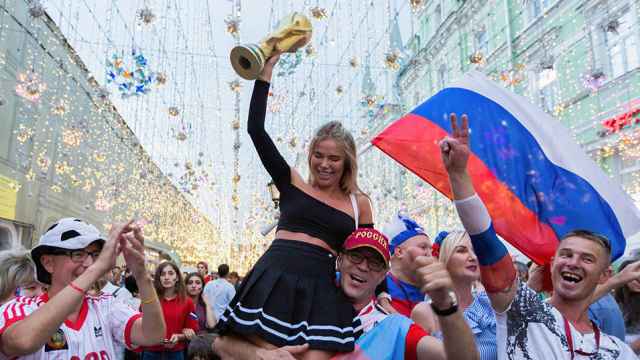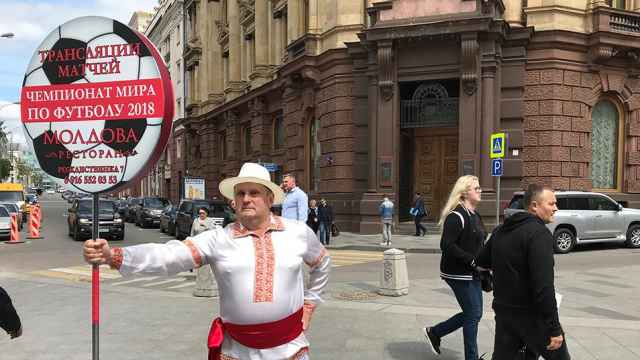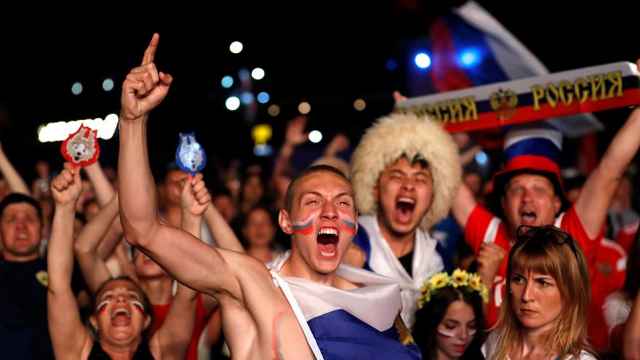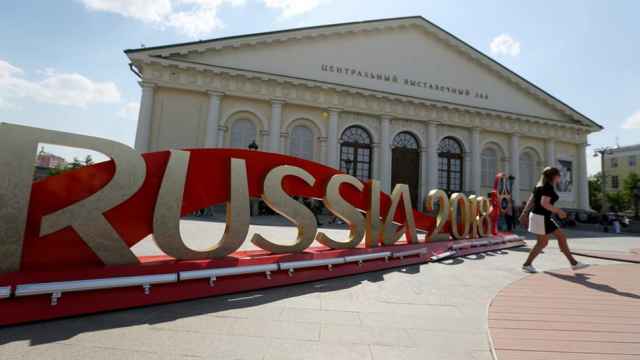Two weeks into the World Cup, a phrase has been so oft-repeated by tourists in Moscow that it could be considered an unofficial motto of the tournament: “It’s much nicer here than I thought it would be.” One American correspondent covering the tournament even dedicated a column to the surprise. “Gray and unfriendly. Barren food shelves and shadowy figures,” he wrote on what he’d imagined before arriving. “I was wrong.”
That he was wrong is, of course, partly a question of preconceived notions. It also has to do with city authorities taking substantial measures to prepare for such a large influx of tourists (and for the mayoral elections that will follow the tournament in September). Since 2015, massive renovations have taken place each summer. Roads and squares and parks have been torn up and reshaped. Softer lighting has been installed. Outdoor cafés have sprouted up along the wider sidewalks and refurbished façades.
And just in case the renovations didn’t go far enough, authorities have also spruced up the place with last-minute zachistki. Translated as “mop-up operations,” they denote authorities cleaning up whatever may soil their efforts to present a clean, safe and modern country to the world.
One of these operations, for instance, included the culling of thousands of stray cats and dogs in an effort to “minimize ecological risks,” as Sports Minister Pavel Kolobkov put it. Activists reported that many of the animals were put down, an attitude perhaps best summed up by one of the business owners awarded a government contract to carry out the work. “Why are we worrying about dogs when we should be worried about people?” he told me.
Because activists are generally used to this heavy-handed approach, they were wary in recent months about what officials might do with the homeless people that call the streets of central Moscow home. Would they be treated like strays, or would they be treated like people? As the World Cup approached, rumors circulated that they would be picked up off the streets during the tournament. Even worse, that they would be swept out to who-knows-where, beyond city limits.
Then, several weeks ago, Moscow’s Department of Labor and Social Protection officials met with activists. They agreed that the main tent in the city where the department and volunteer groups feed the homeless would be temporarily relocated for the duration of the World Cup. At the so-called tryokh vokzalov — the cluster of three train stations aimed for St. Petersburg, Kazan and Yaroslavl — the location was in plain view of tourists. (In a statement, a spokesman for the office cited a “preplanned sanitation” of the area.)
The interim location, in contrast, is far off the beaten track. Set between a train depot and a string of warehouses — both in use and abandoned — on the southeastern edge of the city, a tourist would not run into it. On a recent afternoon there, Max Groshev, 32, told me that he’s now had to trek further to get a meal, but he is still grateful he is provided one. Out of work for a year, he said he’s barely able to afford groceries.
At the former location, a department worker was patrolling nearby. I asked for her take on the relocation. “Would you want homeless people robbing or beating the tourists that are passing through this area?” she said. (One activist has claimed that, at the earlier meeting, he was told: “One month without food won’t kill them.”)
Earlier that day, I had met with Andrei Serykh, who works with the homeless at Moscow’s Salvation Army. “It’s very hard right now,” he said. “There are more than 100 people I would usually feed at tryokh vokzalov, but I can’t go because we were told not to volunteer at any train stations until after the World Cup. I’m worried we would lose our operating license if we went ahead with it.”
Others say that they have lost track of the people they see regularly that require specialized help.
“I haven’t seen six diabetics for over a week, who need the insulin we give them every day,” Lana Zhurkina, director of Dom Druzei, told me, citing the closure of popular meeting points at train stations. “I’m worried that they’re dead by now. Where could they be?”
It isn’t difficult to sympathize with officials wanting to present the best of Russia. It is also heartening that, perhaps because of some of their efforts, stereotypes seem to be losing their stick. And yet, it is worth asking: Was every measure necessary?
Evan Gershkovich is a reporter at The Moscow Times. The views and opinions expressed in opinion pieces do not necessarily reflect the position of The Moscow Times.
A Message from The Moscow Times:
Dear readers,
We are facing unprecedented challenges. Russia's Prosecutor General's Office has designated The Moscow Times as an "undesirable" organization, criminalizing our work and putting our staff at risk of prosecution. This follows our earlier unjust labeling as a "foreign agent."
These actions are direct attempts to silence independent journalism in Russia. The authorities claim our work "discredits the decisions of the Russian leadership." We see things differently: we strive to provide accurate, unbiased reporting on Russia.
We, the journalists of The Moscow Times, refuse to be silenced. But to continue our work, we need your help.
Your support, no matter how small, makes a world of difference. If you can, please support us monthly starting from just $2. It's quick to set up, and every contribution makes a significant impact.
By supporting The Moscow Times, you're defending open, independent journalism in the face of repression. Thank you for standing with us.
Remind me later.



